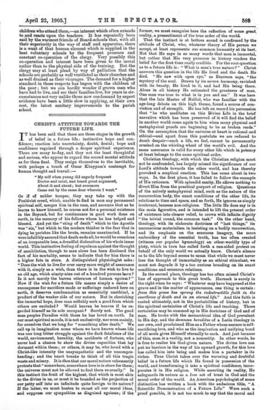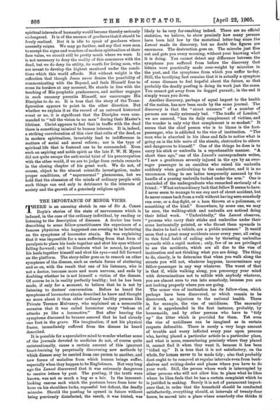CHRIST'S ATTITUDE TOWARDS THE FUTURE LIFE.
IT has been said that there are three stages in the growth of belief in a future life; instinctive hope and con- fidence; reaction into uncertainty, doubt, denial ; hope and confidence regained through a deeper spiritual experience. There are many to-day, and they not the least thoughtful and serious, who appear to regard the second mental attitude as for them final. They resign themselves to the inevitable, with perhaps a touch of Omar Khayyam's contempt for human thought and travail :—
"My self when young did eagerly frequent
Doctor and saint, and heard great argument, About it and about; but evermore
Came out by the same door wherein I went."
Or if of nobler temper, they may take up with the Positivist creed, which, unable to find in man any permanent spiritual self, merges him in the race, and assumes that as he learns to know himself, he craves not for a personal existence in the Beyond, but for continuance in good work done on earth, in the memory of his fellows whom he has helped and blessed. And yet the "sting of death" which to the Apostle was "sin," but which to the modern thinker is the fear that in dying he perishes like the brute, remains unextracted. If he were infallibly assured that death ends all, he would be conscious of an irreparable loss, a dreadful dislocation of his whole inner world. This instinctive feeling of repulsion against the thought of annihilation, though to man alone has been disclosed the fact of his mortality, seems to indicate that for him there is a higher fate in store. A distinguished physiologist asks : "Does the wish to live for ever carry more weight of assurance with it, simply as a wish, than there is in the wish to live to an old age, which ninety-nine out of a hundred persons have ? Is it not merely the barren utterance of human egoism?" Now if the wish for a future life means simply a desire of recompense for sacrifices made or sufferings endured here on earth, it deserves condemnation as essentially unethical, a product of the weaker side of our nature. But in cherishing the immortal hope, does man selfishly seek a good from which others are excluded ? Would heaven be heaven if he re- garded himself as its sole occupant ? Surely not. The good man peoples Paradise with those he has loved on earth. In our most spiritual moods, it is not exclusively, nor even mainly, for ourselves that we long for "something after death." We call up in imagination some whom we have known whose life was one long bitter struggle against the dark fatalisms of the world, environment, heredity, the accidents of fortune, who never had a chance to show the divine capacities that lay dormant within them; or others, it may be, who loved with a Christ-like intensity the unsympathetic and the uncompre- hending; and the heart breaks to think of all this tragic waste and misery. It is then that our moral nature vehemently protests that" somewhere, somewhere love is in store for them; the universe must not be allowed to fool them so cruelly." Is this instinct the fruit of the highest, that which is most akin to the divine in us, or must it be branded as the projection of our petty self into an infinitude quite foreign to its nature? If the latter, we must hasten to recast all our moral ideas, and suppress our sympathies as disguised egoisms ; if the
former, we must recognise here the reflection of some great, reality, a presentiment of the true order of the world.
That the instinct is at bottom sound is confirmed by the attitude of Christ, who, whatever theory of His person we
accept, at least represents our common humanity at its best.
Not that He says in so many words that man is immortal, but rather that His very presence in history renders the belief for the first time really credible. For the root-question as to a future life is : "What is man's true nature ? " Christ answers this question in the life He lived and the death He died. "He saw with open eye," as Emerson says, "the mystery of the soul. Drawn by its severe harmony, ravished with its beauty, He lived in it, and had His being there. Alone in all history He estimated the greatness of man. One man was true to what is in you and me." It was here that the late Master of Balliol, who was familiar with the age-long debate on this high theme, found a source of con- viction and of strength. He has left on record his persuasion that "he who meditates on this Divine Life in the brief narrative which has been preserved of it will find the belief in another world come again to him when many physical and metaphysical proofs are beginning to be as broken reeds."
On the assumption that the universe at heart is rational and ethical—and apart from this postulate we are reduced to dumb despair—such a life, we feel, cannot be permanently crushed on the whirling wheel of the world's evil. And the same assurance is valid for every other life which in potency at least belongs to the same spiritual order.
Christian theology, with which the Christian religion must not be confounded, has largely missed the significance of our Lord's attitude towards the other world, and has thereby provoked a sceptical reaction. This has come about in two ways. In the first place, it has failed to follow the example of His reticence. With splendid sanity, He allows nothing to divert Him from the practical purport of religion. Questions of the naïvely metaphysical mind, such as the nature of the resurrection body, the exact conditions of the other life, its relations to time and space, and so forth, He ignores as simply irrelevant, because non-religious. The little He does say is in the main figurative, and is intended to lift the present order of existence into clearer relief, to crown with infinite dignity "the trivial round, the common task." On the other hand, theology, with its elaborate doctrines of "last things," its unconscious materialism in insisting on a bodily resurrection, and its emphasis on the sensuous imagery, the mere embroidery of the essential truth, has too often created (witness our popular hymnology) an other-worldly type of piety, which in turn has called forth a one-sided protest on behalf of the only world we actually know. Christ's silence as to the life beyond seems to mean that while we must never lose the thought of immortality as an ethical stimulant, we must not degrade it by a too curious brooding on its exact conditions and sensuous relations.
In the second place, theology has too often missed Christ's line of approach to this great truth. Harnaok is surely in the right when he says; "Whatever may have happened at the grave and in the matter of appearances, one thing is certain : froni this grave has sprung the indestructible faith in the overthrow of death and in an eternal life." And this faith is rooted ultimately, not in the probabilities of history, but in the spiritual certainties of Christ's life and teaching. Those certainties may be summed up in His doctrines of God and of man. He broke with the monarchical idea of God prevalent in His day, and the daannosa hereditas of a Latin theology in our own, and proclaimed Him as a Father whose essence is self- sacrificing love, and who as the inspiration and unifying bond of all souls gives Himself eternally to each. And just because of this, man is a reality, not a nonentity. In other words, he is free to realise his God-given nature. The divine love can put no barriers in the way of his upward growth, for this love has called him into being and makes him a partaker in its riches. Thus Christ takes over the wavering and doubtful belief in a future life which He found in possession of the world, and transforming it into a spiritual confidence, incor- porates it in His religion. While asserting its reality, He safeguards its nature as a free act of trust in God and the moral order of the world. An American psychologist of some distinction has written a book with the audacious title, "A Scientific Demonstration of a Future Life." Were such a proof possible, it is not too much to say that the moral and
spiritual interests of humanity would become thereby seriously endangered. It is of the essence of goodness that it should be freely realised. But it is idle to speak of goodness where necessity reigns. We may go further, and say that were men to accept the signs and wonders of modern spiritualism at their face value, we should still be pretty much where we were. It is not necessary to deny the reality of this commerce with the dead, but we do deny its utility, its worth for living men, who are meant to develop the highest manhood under the condi- tions which this world affords. Not without weight is the reflection that though Jesus never denies the possibility of communicating with the Beyond, and feels Himself free to cross its borders at any moment, He stands in line with the teaching of His prophetic predecessors, and neither engages in such uncanny pursuits Himself, nor encourages His Disciples to do so. It is true that the story of the Trans- figuration appears to point in the other direction. But whether we explain it as the record of an outward historical event or no, it is significant that the Disciples were com- manded to "tell the vision to no man" during their Master's lifetime. Christ appears to feel that in traffic with the dead there is something inimical to human interests. It is, indeed, a striking corroboration of this view that cults of the dead, as in modern spiritualism, invariably lead to indifference in matters of social and moral reform ; nor is the type of spiritual life that is fostered one to be commended. Even such an aspiring and noble spirit as the late F. W. H. Myers did not quite escape the anti-social taint of his preoccupation with the other world, if we are to judge from certain remarks in the closing chapter of his great work. We do not, of course, object to the utmost scientific investigation, under proper conditions, of " supernormal " phenomena, but we hold that the obsession of the minds of ordinary people with such things can end only in detriment to the interests of society and the growth of a genuinely religious spirit.



































 Previous page
Previous page